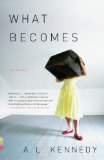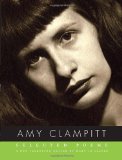Summary | Excerpt | Reviews | Beyond the book | Read-Alikes | Genres & Themes | Author Bio

New and Selected Poems
by Kay RyanPoets have obsessions - structures or ideas they return to ruminate on again and again. Sifting these out usually requires deep readings and re-readings, putting batches of poems in the gold pan of your mind until the motifs rise up and glimmer jewel-like on the surface. Returning to a poet you know in this way can feel wonderful; like a secret shared, or holding your lover's hand, the sensation still holds enough mystery to keep you returning, but the knowing brings you deeper. But the time and care it takes to reveal a poet's secrets might be daunting to the new poetry reader.
Enter Kay Ryan, 16th Poet Laureate of the United States. Despite her lofty government-issued title, Ryan lays her poet's cards right out on the table, in short, sly poems that wear their obsessions boldly and yield their secrets willingly. You can re-read a Kay Ryan poem several times in one minute and mine it quickly for its hidden treasures. "Say Uncle" showcases her style and trademark preoccupations in just 15 lines:
Every day
you say,
Just one
more try.
Then another
irrecoverable
day slips by.
You will
say ankle,
you will
say knuckle;
why won't
you why
won't you
say uncle?
Funny, right? "Ankle" and "knuckle" are funny-sounding words all by themselves, and the botched homophones make the poem delightfully silly. Upon first reading, that's what I notice most: it's rhythmic and funny. Read it again, and this time I get caught on the last lines. A little haunting feeling, or is it more sad, or wistful? Something darker lies inside. Read it again, lingering this time on "just one more try" and "another irrecoverable day slips by." Now I'm closer to knowing just what the speaker is urging the subject to give up, and the poem has suddenly changed, the fun is over, the echo of earlier laughter now haunting and mocking.
Ryan leads you playfully to the end the diving board with rhyming words and paired sounds, delicious nouns and rich words, sing-songy cadence and consonance; you don't realize she's tied a block of cement to your foot til you're already over the edge.
Reveling in the tricky origins of words, Ryan reveals the ways we manipulate language, and how we can fool ourselves and hide behind ambiguity or double-meanings:
CRIB
From the Greek for
woven or plaited,
which quickly translated
to basket. Whence the verb
crib, which meant "to filch"
under cover of wicker
anything--some liquor,
a cutlet.
For we want to make off
with things that are not
our own. There is a pleasure
theft brings, a vitality
to the home.
Cribbed objects or answers
keep their guilty shimmer
forever, have you noticed?
Yet religions downplay this.
Note, for instance, in our
annual rehearsals of innocence,
the substitution of manger for crib--
as if we ever deserved that baby,
or thought we did.
Many of Ryan's poems end on a note of warning or admonition, the sudden turns at the end serving as reprimands that probe assumptions and intentions, lies we tell ourselves, or mental trickery we use to ease our fears. "We" is the subject here - Ryan is squarely speaking from a level moral ground. Far from wise or superior, she's in the same game as the rest of us, trading everyday wickedness for the occasional moments of grace. Her poems are likeable and accessible (an equally lauded and derided descriptor of poetry), but that doesn't mean they're easy or entirely pleasant. Readers looking for soothing meditations on beauty or nature to set them at ease might be beguiled at first quick glance by a Kay Ryan poem, but they'll be unceremoniously knocked onto their backsides if they read through to the end. Those of us who choose to weather the kick to the curb will be richly rewarded, if slightly bruised.
![]() This review was originally published in The BookBrowse Review in April 2010, and has been updated for the
April 2011 edition.
Click here to go to this issue.
This review was originally published in The BookBrowse Review in April 2010, and has been updated for the
April 2011 edition.
Click here to go to this issue.

If you liked The Best of It, try these:

by A.L. Kennedy
Published 2011
Powerful and funny, intimate and profound, the stories in What Becomes capture the spirit of our times with dark humor, poignant hopefulness, and brilliant evocation of contemporary social and spiritual malaise.

by Amy Clampitt
Published 2010
Here is a treasure of Amy Clampitt's verse, for those who are reading her for the first time, as well as for those who have long admired her.
Your guide toexceptional books
BookBrowse seeks out and recommends the best in contemporary fiction and nonfiction—books that not only engage and entertain but also deepen our understanding of ourselves and the world around us.